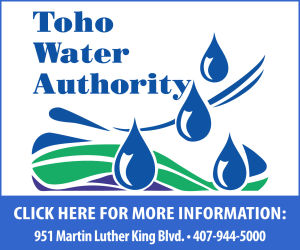Emergency managers and other officials from Osceola County and across the state are urging residents to prepare for a hurricane before the next one takes aim at Florida.
And that could be anytime now that hurricane season has started.
The last three years have seen four hurricanes make landfall in Florida and the National Oceanic and Atmospheric Administration is predicting an “above-normal” 2021 Atlantic hurricane season, with 13-20 named storms, 7 hurricanes, and 3 major hurricanes expected.
Tropical Storm Ana already formed early in May, along with Tropical Storm Bill that formed in the Atlantic last week.
Florida Chief Financial Officer Jimmy Patronis last week held a hurricane preparedness event last week in Orlando and was was joined by members of the region’s Urban Search & Rescue Florida Task Force 4 to speak about the importance of hurricane preparedness.
“This dedicated team of first responders run towards a storm to save families in the aftermath of a hurricane,” he said.
There are eight teams in the state that train year-round to protect Floridians when a disaster strikes. They respond to both natural and man-made disasters, providing search and rescue, medical support, communications, and damage assessment.
“It is critical that residents heed all warnings from local authorities and take the proper precautions to stay safe before, during, and after a storm,” he said. As we’ve seen in the past, hurricanes can form and strengthen quickly, leaving little time to prepare and evacuate.”
Many know to buy canned food, water and things like flashlights and generators. But here are a few things you might think to do to help to prevent major financial headaches down the road. • Make an itemized list of your belongings, including
• Make an itemized list of your belongings, including costs, purchase dates and serial numbers. Attach receipts, especially for “big ticket” items. Your insurance company may require proof of the cost of any item for which you make a claim. Dated photographs or videotapes of your possessions are also good ideas.
• Take copies of your legal, financial and medical documents with you, including bank statements, insurance policies, mortgage information, credit card addresses and toll-free phone numbers, wills, birth certificates, passports and medical prescriptions. Flood insurance will not cover the cost to replicate these official documents.
• Write down the names of your home insurance company and agent, your policy number and telephone numbers to report claims. Remember that the name of your insurance company might differ from that of your agent, agency or underwriter.
• Remember to withdraw money before a pending disaster. Since carrying or keeping large amounts of cash in your home can be unsafe, take out only as much as you’ll need. Financial institutions may be closed immediately after a direct hit due to conditions such as road hazards, building damage and/or lack of electricity. It is important to withdraw funds in advance of a storm.
For more hurricane and disaster-related information and resources, visit PrepareFL.com.




